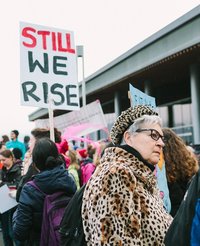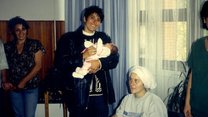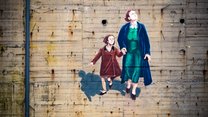Transgenerational trauma – violence shapes us
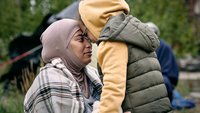
Traumatic experiences have far-reaching consequences. If they are not dealt with and processed, they can be passed down as transgenerational trauma to our children, grandchildren and society. Wartime rapes and other forms of sexualised violence often have have war trauma or some other form of traumatisation as a consequence. This damages physical and psychological integrity, destroys trust and confidence, and reduces the capacity to form relationships. Rape myths, stigmatisation, and the taboos surrounding violence within our families and society all make it more difficult for many survivors of sexualised (wartime) violence to speak about their experience of violence and find appropriate support support to overcome their war trauma. In this way, traumata do not just affect the life of the persons directly affected, but even in times of peace it continues to have impacts on their families and whole societies, often for generations. In the field of research, the intergenerational inheritance of trauma is called epigenetics.
FAQ: Transgenerational trauma
What does ‘transgenerational trauma’ mean?
The term ‘transgenerational trauma’ is used to refer to the generally subconscious transmission of traumatic experiences to subsequent generations and to society. People in the next generation find themselves showing the symptoms of trauma without having experienced the trauma themselves. Traumatic experiences can affect individual, single people or they can affect many people within a group. The term ‘collective trauma’ is used in this case where trauma affects many people within a group. Examples of individual trauma can be violence within a family, life-threatening illnesses, accidents, and abuse in childhood. Examples of collective trauma include the Holocaust, or the mass rape of women during the genocide in Rwanda.
How does transgenerational traumatisation occur?
The roots of transgenerational traumatisation initially lie in the traumatic experiences of one person or one group. These traumas are often not conscious, they are not recognised by society, and they are associated with feelings of guilt and shame, being treated as a taboo. The people affected do not receive appropriate support from their communities or societies. All of this can prevent this trauma being processed. Unprocessed trauma can then affect the way people form relationships with their own children. The impacts may influence manners of reacting, avoidance behaviour, or the ways of dealing with emotional intimacy and distance. In turn, they develop stress reactions, conflicts and emotional pressures. Even if they are often not aware of this, these patterns are then nevertheless passed on in turn to their children.
What are the characteristic symptoms of transgenerational trauma?
The offspring of traumatised parents or grandparents frequently describe that there was a dark and heavy mood of silence laying over their family which they could not clearly place. There were also often feelings of guilt without any tangible cause. Many of the children or grandchildren suffer from depression, a diffuse anxiety, feelings of helplessness, shame, deep insecurity, feeling lost in the world or repressed anger. Some have recurrent, stressful dreams that seem to be set in the period lived through by their parents or grandparents. Often they have a suspicion that these symptoms are not directly related to their own behaviour or experience.
Can trauma be passed down through more than one generation?
From Holocaust research and research with war veterans, it is known that the trauma can reach down into the third generation, and possibly further. An awareness that wartime rape is not an individual fate but one that has impacts on children, grandchildren and the social surroundings is a decisive factor when it comes to successful processing of this violence and the wider consequences.
What significance does the transmission of trauma have in epigenetics?
Numerous studies suggest that trauma can also have an impact right down to the level of the genes via epigenetic effects, and can be passed on to subsequent generations in this way. For example, one study on the Dutch famine of 1944-45 (the ‘Hongerwinter’) indicates that the descendants of starving pregnant women tend to be overweight, as the body seems to have genetically trained itself for food shortages. Another study found lower cortisol levels in children whose mothers had survived the terror attacks on the World Trade Centre and suffered post-traumatic stress disorders as a consequence. Low cortisol levels are associated with susceptibility to post-traumatic stress disorder. Alongside adrenaline, cortisol is the most important hormone that helps us to deal with stress.
Is there a connection to (sexualised) wartime violence?
Wartime rapes harm physical and psychological integrity, attacking the core of a human being: trust in social relationships. Studies from various countries show that about half of those affected by sexualised violence – whether in times of peace or war – suffer long-term consequences such as insomnia, uncontrollable flashbacks, or anxiety. Violence shapes us. In one study conducted by medica mondiale and Medica Zenica almost 20 years after the end of the war in Bosnia, 70 per cent of the surveyed women indicated that the rape was still completely dominating their life. The stigmatisation of those affected, the taboos within the family and society surrounding gender-based violence, and a lack of official acknowledgement for the injustice they were subjected to: all of this can exacerbate the post-traumatic consequences. It is of essential importance that people affected by sexualised violence are not forced to remain silent about their devastating experiences, and that they receive the solidarity and support that they need to deal with these. It is, after all, possible to avoid passing down anxieties, defensive reactions and stress to children and grandchildren.
Is there a connection to World War II and to the Holocaust?
Millions of women and girls in Europe and Asia were subjected to sexualised violence during World War II and in the post-war period. This affected women and girls who had been persecuted by the National Socialists and incarcerated in work, concentration and extermination camps, Jews, Romnja and Sintize, people deemed to be ‘asocial’, and members of the resistance. It also affected women and girls in the German occupied territories of the Soviet Union, Poland, France, the Netherlands and the partisans in, for example, Yugoslavia. And women and girls from Korea, China, Taiwan and the Philippines who were kidnapped and sexually enslaved by the Japanese military. They were referred to euphemistically as ‘comfort women’, masking the horrors of the crime. There are also documented cases of abuse by Soviet, US American, French and British soldiers at the end of the Second World War.
Are there studies on transgenerational trauma?
As a field of international research, transgenerational traumatisation is still relatively young. It mainly attracted the attention of psychologists, social psychologists and social scientists, but insights have also recently been gained from the natural sciences (neurobiology) and literature studies. Fundamental insights on transgenerational traumatisation were gained in the 1960s during research with Holocaust survivors. By 2011, there were 500 published papers on this. In Germany, this issue first began to be researched in the 1980s. There are, however, still relatively few scientific studies on the transgenerational consequences of sexualised violence.
- Kriegsenkel: Die Erben der vergessenen Generation [War Grandchildren – the Heirs of the Forgotten Generation]
Bode, Sabine - Legacy of Silence: Encounters with Children of the Third Reich
Dan Bar-On - Der Krieg in mir [The War in Me]
Heinzel, Sebastian
- Collective Trauma and Resilience
Key Concepts in Transforming War-Related Identities., Berghof Handbook Dialogue Series No. 11 (June).Reimann, C. und König, U. (2017) - Transmissions and Chosen Traumas: An Aspect of Large-Group Identity
Group Analysis. Vol. 34, 2001, pp. 79-97. Volkan, V. (2001) - Addressing Individual and Community Transgenerational Trauma
(Australia). Judy Atkinson, Jeff Nelson, Robert Brooks, Caroline Atkinson and Kelleigh Ryan (o.J.) - Trauma, Transgenerational Transfer and Effects on Community Wellbeing
Atkinson, Judy et. al. (2010) - Post Traumatic Slave Syndrome. America's Legacy of Enduring Injury and Healing
Uptone Press. Degruy, Joy (2005) - Historical trauma among indigenous peoples of the Americas: Concepts, research, and clinical considerations
Journal of psychoactive drugs, 43(4), 282-290. Brave Heart, M. Y. H., Chase, J., Elkins, J., & Altschul, D. B. (2011) - Gender differences in the historical trauma response among the Lakota
Journal of Health & Social Policy 10(4): 1–21. Brave Heart, M. Y. H. (1999) - The trauma experienced by generations past having an effect in their descendants
Narrative and historical trauma among Inuit in Nunavut, Canada, Transcultural Psychiatry 51(3): 339–369. Crawford, A. (2014)
What consequences does transgenerational trauma have for society as a whole?
The women and girls affected are often left alone to cope with their trauma. Again and again they are stigmatised by society, and ostracised. They suffer physical, psychological and existential crises – and this often applies to their children, too. The consequences for society as a whole are also extremely serious. The transmission of these trauma to the next generation generally represents a perpetuation of the spiral of violence. If society remains silent about this topic, then it remains a taboo and there are very few chances to openly name these consequences and work on them. This all leaves its mark at the individual level, but also at the level of family and society. A society which neither acknowledges the consequences nor names the causes will inevitably create an atmosphere which transmits those impacts further rather than resolving them.
How can the issue of transgenerational traumatisation be raised within a family?
Issues that were taboo or silenced have to be approached carefully. Remaining silent can be an important defence mechanism for those affected, helping them deal with their everyday lives. These patterns should not be changed unless trust and security are present. Questions need to be asked sensitively. They should not target details but instead just be asked as prompts to encourage speaking. It can also be helpful to find a different, safe space or context if we want to look at our own questions as a child or grandchild, for example. There are a range of options here: for some it will be a self-help group, for others a best friend, therapy or even a spiritual path.
Is there a therapy for transgenerational traumatisation?
As yet there is no specific therapy for transgenerational traumatisation. However, there are a growing number of therapists, mainly working in trauma therapy, who have begun to integrate the issue of transgenerational transmission. Some are even developing their own therapy methods for this. For example, the trauma therapist Katharina Drexler presented one of the first structured approaches to treating transgenerational trauma in her book which was published in 2017 “Ererbte Wunden heilen. Therapie der transgenerationalen Traumatisierung" [Healing Inherited Wounds – Therapy for Transgenerational Traumatisation]
How can the generational transmission of trauma be prevented?
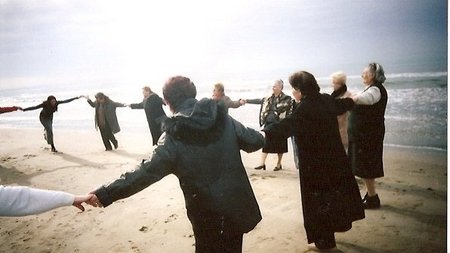
It is important to process the trauma as soon as possible. A very significant factor here is how the affected person experiences their social and socio-political environment. Ideally, they feel supported because their suffering is acknowledged and support is made available to them to process their experiences of violence. They need people they can turn to in their immediate surroundings who are capable of a safe and trusting relationship with the survivors. There is also a need for safe spaces where the issues can be talked about. The act of speaking itself can have a healing effect on the survivor’s relationships to other people and to themselves. If this can occur at the level of relationships and families, then in the long term it will also have an impact on society as a whole. A Stress- and Trauma-sensitive Approach can help to create stabilising surroundings for survivors, empowering them and allowing them to be at ease and open up.
Sexualised violence often occurs in situations where various discriminations overlap – or intersect, hence the term ‘intersectionality’. For example, women and girls who are already discriminated against for their race or disability are also at higher risk of being subjected to sexualised violence. Work to prevent violence therefore needs to be sensitive to discriminations and to tackle the underlying causes of violence and trauma.
What opportunities are there for state intervention?
An important aspect is public acknowledgement that sexualised violence is an injustice which has impacts on following generations. In order to overcome the culture of silence, statements of position are needed from authorities and public figures, such as politicians. This sends an important message. One way to demonstrate this recognition, and also to start a public, cross-generational debate on the issue, is to establish a memorial to raped women. Another point is to build up and secure the provision of low-threshold offers of support and therapy for affected women in every age group, as well as for their relatives.
What can society do to resolve and prevent transgenerational trauma?
A secure and suitable framework is needed to name and acknowledge the injustice and the injuries. While looking back to the past experiences is essential, it is also necessary to look at the present: how are survivors living now and what support would be appropriate. Rituals, memorial events and political actions can all have a healing effect. For this, it is important to adopt a nuanced approach that does not merely portray the women as victims, but also values the strength they demonstrate by surviving. In order to prevent further generational transmission of the trauma, a pro-active way of dealing with past and with sexualised violence is needed.
What we do: Processing trauma and supporting survivors sustainably
medica mondiale worked closely with its partner organisations to develop the Stress- and Trauma-sensitive Approach (STA). The basic principles of this are stability and security, connection and empowerment, which ensures the strengthening of those affected by sexualised violence. This approach helps to give rise to the supportive surroundings and sustainable conditions for prevention.
Rwanda and Bosnia: Liberating the “Children of War” and their mothers from stigma
In order to alleviate or even prevent the transgenerational consequences of violence, one of the measures at medica mondiale is to support survivors of sexualised violence and children born out of rapes during the 1994 genocide in Rwanda. Hundreds of thousands of women, mainly Tutsi, were systematically subjected to rape. One of the consequences for many of them was an unwanted pregnancy leading to children who are now referred to as “bad memories”, “hate” or “bad luck”. Living with the “children of the perpetrators” usually means being excluded from their society, losing access to social support and increased feelings of isolation, which all exacerbate the impacts of the trauma of being raped.
By carrying out this support work, our Rwandan partner organisation SEVOTA aims to break the silence and taboos between mothers and children, and within families and societies. Together with other organisations, in 2005 they set up the women’s forum Abiyubaka (“people who help each other”). The therapeutic work and sharing experiences with other affected women help the women to recognise that they have not lost their dignity or their self-esteem. In turn, this often leads to a change in their attitude towards their children: they begin to see them differently and regard them the way they do other children.
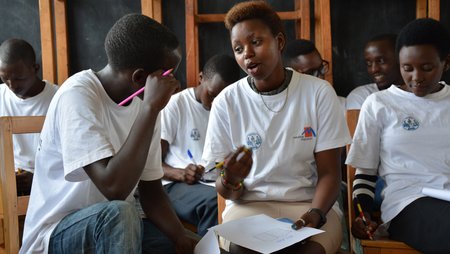
A similar approach was later developed by SEVOTA to work with them as they grow up. By organising youth camps, a space is provided for them to deal with their past, getting to know themselves and their feelings better. Many of the young people reported greater self-esteem, improvements in their relationships with their mothers, and even discovering the courage needed to take part in income-generating projects.
In Bosnia and Herzegovina, the daughter of a former client of Medica Zenica set up an organisation to work for the acknowledgment and rights of the children born out of war rape – The Forgotten Children of War Association.
Germany: Creating space, honouring experiences, enabling memories
With its campaign “Never merely history – Together against sexualised wartime violence”, in 2020 medica mondiale again called on people to remember the severe violations of human rights suffered by millions of women and girls during and shortly after World War II. medica mondiale raises awareness of the fate of numerous women and girls, but also pays tribute to their strength in dealing with their suffering. We create a space for their stories, and those of their relatives, children and grandchildren. We want to demonstrate our solidarity publicly and are calling for a memorial to all women raped during the Second World War and every war since then. These women and their stories are part of us.
Bosnia and Kosovo: War pensions for women as an acknowledgement of their suffering of sexualised wartime violence
Their social surroundings are crucial for survivors, which is why medica mondiale works together with partner organisations at the levels of the family, community and society, with measures such as awareness raising, publicity and political women’s rights work. The aim is to gradually empower women and following generations to speak about the experiences and for these to be acknowledged.
One success for medica mondiale and its partner organisations is the introduction of a monthly compensation pension in Bosnia and Herzegovina and Kosovo for women affected by sexualised wartime violence. A pension such as this contributes towards the acknowledgement of the suffering of these women and girls, helping them to find a more confident and open approach in their lives. In turn, this has a positive effect on their relationship with their children and their whole social surroundings.

